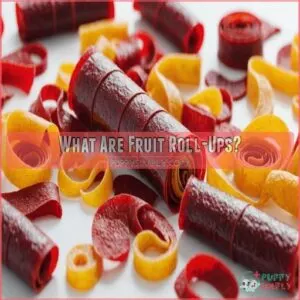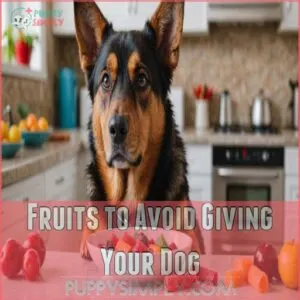This site is supported by our readers. We may earn a commission, at no cost to you, if you purchase through links.
 No, your dog shouldn’t eat Fruit Roll-Ups, no matter how puppy-dog eyes they give you. These sticky snacks are packed with artificial ingredients and high amounts of sugar that can harm your furry friend’s health.
No, your dog shouldn’t eat Fruit Roll-Ups, no matter how puppy-dog eyes they give you. These sticky snacks are packed with artificial ingredients and high amounts of sugar that can harm your furry friend’s health.
While your pup might dream of joining you in your nostalgic snack time, these treats can cause serious problems like dental issues, digestive upset, and even choking hazards.
Just like you wouldn’t give a toddler coffee, some human treats just aren’t meant for our four-legged friends.
But don’t worry – there are plenty of dog-friendly fruit options that’ll make your pup’s tail wag with joy.
Table Of Contents
- Key Takeaways
- What Are Fruit Roll-Ups?
- Dangers of Fruit Roll-Ups for Dogs
- Can Dogs Eat Fruit?
- Fruits to Avoid Giving Your Dog
- What to Do if Your Dog Eats Fruit Roll-Ups
- Healthy Alternatives to Fruit Roll-Ups
- The Canine Digestive System and Human Food
- Signs Your Dog May Have Eaten Something Harmful
- When to Consult a Vet About Fruit Roll-Ups
- Frequently Asked Questions (FAQs)
- Can dogs eat fruit?
- Can dogs eat fruit if they have an upset stomach?
- Can dogs eat oranges?
- Can dogs eat strawberries?
- Are Fruit Roll-Ups safe to eat?
- Are dogs allowed to eat fruit snacks?
- Can dogs eat fruit bun?
- Can dogs eat fruit snacks motts?
- How long does it take to digest Fruit Roll-Ups?
- Can Fruit Roll-Ups cause permanent damage to dogs?
- Are sugar-free Fruit Roll-Ups safer for dogs?
- Do different Fruit Roll-Up flavors affect dogs differently?
- How many Fruit Roll-Ups would make a dog sick?
- Conclusion
Key Takeaways
- Don’t give your dog Fruit Roll-Ups – they’re packed with sugar and artificial ingredients that can harm your pet’s health.
- Watch out for symptoms like vomiting, diarrhea, or unusual behavior if your dog accidentally eats Fruit Roll-Ups, and contact your vet immediately.
- Offer safe, dog-friendly fruits like apples, bananas, or blueberries as occasional treats instead of processed snacks.
- Keep human snacks out of your dog’s reach and educate family members about foods that are dangerous for pets to prevent accidents.
What Are Fruit Roll-Ups?
You’ve probably seen those colorful, stretchy snacks in your kid’s lunchbox, but what exactly are Fruit Roll-Ups?
They’re sugary treats that come in various fruity flavors, with a taffy-like texture that’s fun to unroll and eat, but don’t let the word "fruit" fool you – these snacks aren’t as healthy as they might sound.
Ingredients in Fruit Roll-Ups
Ever wondered what’s really in those sticky, colorful Fruit Roll-Ups your kids love?
They’re not exactly a fruit salad.
These sugary snacks are packed with ingredients you mightn’t expect:
- Artificial colors that make them look like a rainbow
- Preservatives to keep them "fresh" for months
- Natural and artificial flavors for that fruity taste
Don’t be fooled by the "fruit" in the name.
These treats are more chemistry than orchard, and they’re definitely not dog-friendly.
Nutritional Content of Fruit Roll-Ups
Let’s unwrap the truth about Fruit Roll-Ups‘ nutritional content.
You might think these snacks are fruity and fun, but they’re more like sugar bombs in disguise.
Here’s a quick breakdown of what’s really inside:
| Nutrient | Amount per serving |
|---|---|
| Calories | 50 |
| Sugar | 11g |
| Carbohydrates | 13g |
| Protein | 0g |
| Fat | 0g |
As you can see, these treats are mostly sugar and carbs, with little nutritional value for your furry friend.
Original Flavors and Varieties
Across the colorful landscape of Fruit Roll-Ups, you’ll find a rainbow of flavors that might spark childhood memories.
These sticky, sweet treats come in various options that have evolved over time:
While Fruit Roll-Ups might be a tasty snack for kids, its high sugar content, similar to high sugar fruit snacks, can be detrimental to your dog’s health.
- Strawberry Sensation: The OG flavor that started it all
- Berry Berry Cool: A mix of blueberry and raspberry goodness
- Tropical Tie-Dye: A tropical twist for your taste buds
- Mystery Flavor: A surprise in every bite
While these flavors might tempt you, remember they’re not safe for your furry friends.
Dangers of Fruit Roll-Ups for Dogs
You might think those colorful, fruity snacks are harmless, but many popular fruit snacks, like Fruit Roll-Ups, often contain artificial sweeteners like xylitol in fruit juices, which can be extremely hazardous to your furry friend. Fruit Roll-Ups can spell trouble for your furry friend.
From their high sugar content to artificial ingredients and potential xylitol toxicity, these treats pose several risks that every dog owner should know about.
High Sugar Content and Health Risks
Despite their fruity name, Fruit Roll-Ups are a sugar bomb for your furry friend.
You’re basically giving your pup a one-way ticket to health troubles.
These sticky snacks can lead to a sugar overload, putting your dog at risk for obesity, diabetes, and even pancreatitis.
It’s like feeding them a sweet disaster waiting to happen.
Stick to dog-friendly fruits and healthy snacks instead – your pooch’s waistline will thank you!
Dental Issues and Artificial Ingredients
Sticking to your dog’s teeth like glue, Fruit Roll-Ups can wreak havoc on their pearly whites.
These sugary snacks aren’t just a cavity waiting to happen; they’re packed with artificial ingredients that’ll make your pup’s tummy do backflips.
Skip the store-bought treats and whip up some homemade goodies instead.
Your furry friend’s teeth and tummy will thank you, and by following a pet parents guide, you’ll be the top dog in pet care.
Plastic Wrapper Hazards and Xylitol Toxicity
Two major dangers lurk in Fruit Roll-Ups for your furry friend.
First, the plastic wrapper can cause a dangerous blockage if swallowed.
It’s like your pup trying to digest a grocery bag – not good!
You can find more pet-friendly alternatives to Fruit Roll-Ups on websites selling Fruit Roll Ups Dog products.
Second, some varieties contain xylitol, a sweetener that’s toxic to dogs.
Even a small amount can send your pooch’s blood sugar plummeting, leading to serious health issues.
Keep those treats out of paw’s reach!
Can Dogs Eat Fruit?
You’ve seen your pup eyeing your fruit bowl, but can dogs really eat fruit?
While some fruits are safe and even beneficial for your furry friend, it’s important to know which ones to offer and how much is too much.
Safe Fruits and Recommended Serving Sizes
While Fruit Roll-Ups are a no-go, many fruits can be safe and healthy treats for your furry friend.
You’ll want to stick to dog-friendly options and keep portions in check.
Here’s a quick rundown of some paw-some fruits and their serving sizes:
- Apples: 1-2 slices (no seeds or core)
- Blueberries: 2-3 berries
- Bananas: 2-3 small pieces
- Watermelon: 1-2 small cubes (seedless)
Remember, fruits should be occasional treats, not meal replacements.
Your pup’s tail will be wagging in no time!
Importance of Moderation and Fruit Variety
Regarding feeding your pup fruits, balance is key.
Mix it up with a variety of safe options like apples, bananas, and blueberries.
Think of fruits as special treats, not everyday chow.
Keep portions small – about 10% of their daily calories.
This way, you’re giving your furry friend a nutritional boost without overdoing it.
Remember, moderation’s the name of the game in keeping your dog’s diet balanced and tail-wagging happy!
Avoiding Fruit Pits, Seeds, and Leaves
Let’s talk about the hidden dangers lurking in fruits.
You’ve got to watch out for those sneaky pits, seeds, and leaves!
They’re like little ticking time bombs for your furry friend.
Take cherries, for example.
Those pits are no joke – they contain cyanide!
And apple seeds?
They’re not exactly a walk in the park either.
Always prep your pup’s fruity treats carefully, removing any potential hazards.
It’s better to be safe than sorry!
Fruits to Avoid Giving Your Dog
While many fruits are safe for dogs, some can be downright dangerous.
You’ll want to keep cherries, avocados, grapes, and raw tomatoes far away from your furry friend to avoid potentially serious health issues.
Toxic Fruits Like Cherries and Avocado
cherries and avocados are no-go fruits.
Cherry pits pack a punch of cyanide, which can lead to serious fruit poisoning in dogs.
Avocado toxicity is no joke either – it can cause vomiting and diarrhea.
Don’t let your pup become a cautionary tail!
Stick to safe fruit alternatives like apples or bananas to keep those tails wagging and canine health risks at bay. Pet owners should be aware of the potential risks of certain snacks, such as veggie straws for dogs, to keep their pets healthy and happy.
Grapes and Tomatoes: Hidden Dangers
Beware, pet parents, some fruits and vegetables can be a recipe for disaster.
Grapes, including raisins, can cause severe kidney damage in dogs.
Tomatoes, especially when unripe, contain solanine, which can be toxic.
While some human snacks like jicama are low-calorie and rich in fiber, making them a potentially healthy option for dogs in moderation, check jicama’s benefits and risks.
Keep your pup safe by being aware that even treats like cheesecake can be toxic due to ingredients like xylitol, and avoiding xylitol in desserts
- Storing grapes and tomatoes out of reach
- Educating family members about the dangers
- Offering safe alternatives like blueberries or apple slices
Don’t let these hidden dangers turn your pooch’s snack time into a vet visit.
Stick to dog-approved treats and fruits to keep tails wagging and pups healthy.
Identifying Symptoms of Fruit Toxicity
While grapes and tomatoes pose hidden risks, other fruits can be equally dangerous.
Red flags to watch out for include: vomiting, diarrhea, lethargy, tremors, or seizures.
These symptoms might mean your furry friend has eaten something toxic.
It’s like they’ve gone on a wild fruit bender, but without the fun.
If you spot these signs, don’t wait – call your vet pronto!
What to Do if Your Dog Eats Fruit Roll-Ups
If your dog snags a Fruit Roll-Up, don’t panic, but act fast.
Keep an eye out for unusual symptoms.
If you’re worried, give your vet a call – they’re used to dealing with sneaky pups who’ve nabbed people food.
Immediate Action and Veterinary Care
Uh-oh, your pup got into the Fruit Roll-Ups? Don’t panic!
First, remove any remaining snacks from your dog’s reach.
If they’ve eaten a lot or you suspect they’ve swallowed the wrapper, call your vet pronto. They might recommend bringing your furry friend in for a check-up.
Time is of the essence in these situations, so don’t wait to seek professional help if you’re worried.
Monitoring for Signs of Illness and Toxicity
Keep a watchful eye on your pup after they’ve snacked on Fruit Roll-Ups.
Look out for telltale signs of trouble: vomiting, diarrhea, or unusual behavior.
These could signal xylitol poisoning or other health issues.
If your furry friend seems off, don’t play the waiting game.
Ring up your vet pronto – they’re the real experts in dog health.
Better safe than sorry, right?
Preventing Future Incidents and Accidents
Occasionally, even the most vigilant pet parents face close calls.
To prevent future Fruit Roll-Up mishaps, take proactive steps to safeguard your furry friend. Store snacks out of paw’s reach and teach kids the importance of not sharing human treats with pets.
- Create a "dog-proof" pantry with childproof locks
- Educate family members about dangerous foods for dogs
- Keep trash cans secured and inaccessible
- Use positive reinforcement to train "leave it" commands
- Offer safe, dog-friendly alternatives for treat time
Healthy Alternatives to Fruit Roll-Ups
You don’t have to deprive your furry friend of tasty treats just because Fruit Roll-Ups are off the menu.
From safe fresh fruits like cyanide-free cherry alternatives to homemade dog treats, there are plenty of healthier options that’ll make your pup’s tail wag with delight.
Commercial Dog Treats and Safe Options
Your pup’s tail will wag for these tasty alternatives to Fruit Roll-Ups.
Look for commercial dog treats with natural ingredients and clear labels. Avoid treats with artificial additives or xylitol.
Pet food regulations guarantee safer options, but always check the ingredient list.
Consider your dog’s breed-specific diet needs when choosing treats.
Remember, moderation is key – treats shouldn’t make up more than 10% of your furry friend’s daily calorie intake.
Homemade Dog Treat Recipes and Fresh Fruit
While store-bought treats are convenient, nothing beats the love in homemade goodies for your furry friend. Whip up some tail-wagging treats using dog-safe fruits and simple ingredients. It’s like baking for your best bud! Plus, you’ll know exactly what’s going into their snacks, which is especially important if you’re considering using alternatives to products like Fruit Roll Ups Safe Dogs.
Here are some paw-some ideas to get you started:
- Frozen banana and peanut butter pops
- Apple and carrot biscuits
- Blueberry and oatmeal cookies
- Pumpkin and yogurt frozen treats
Fruit Leather and Other Wholesome Snacks
Homemade treats are great, but let’s talk about fruit leather and other wholesome snacks for your furry friend.
Unlike store-bought Fruit Roll-Ups, homemade fruit leather can be a nourishing dog snack. For example, you can also try making peanut butter pumpkin treats for a tasty and healthy reward.
Just blend safe fruits, spread thinly, and dehydrate. It’s a tail-wagging treat!
For more wholesome food options, try carrot sticks, apple slices, or frozen banana chunks. Your healthy pet pantry will be bursting with tasty, dog-friendly goodies in no time!
The Canine Digestive System and Human Food
Your dog’s digestive system isn’t built for human junk food, so those Fruit Roll-Ups aren’t doing Fido any favors.
Understanding how your pup processes sugars and artificial ingredients can help you make better snack choices and keep that tail wagging for years to come.
How Dogs Process Sugars and Artificial Flavors
Dogs’ bodies aren’t built for processing sugars and artificial flavors like ours.
Let’s peek into their digestive system:
- Fido’s pancreas works overtime to handle sugar overload
- Artificial flavors can trigger tummy troubles faster than you can say "fetch"
- Sugar metabolism in dogs is like a rollercoaster – quick highs, sharp drops
- Food sensitivities might turn your pup into a drama queen
- Canine gut health takes a hit with every sugary bite
Remember, your furry friend’s not equipped for junk food adventures!
Impact of Processed Foods on Canine Health
You’ve seen how your pup’s body handles sugars and artificial flavors. Now, let’s talk about the bigger picture.
Processed foods can throw your furry friend’s health for a loop. They’re like junk food for dogs, potentially leading to a pet obesity epidemic.
These foods might spark a dog food addiction, messing with your pup’s natural eating habits.
Processed meat risks include digestive upset and long-term health issues.
Keep an eye out for toxic food recalls to protect your canine’s gut health.
Importance of Nutritious and Balanced Diets
Now that we’ve seen how processed foods can wreak havoc on your pup’s health, let’s talk about what they really need.
A balanced diet is the cornerstone of your dog’s wellbeing. It’s not just about avoiding junk; it’s about giving them the good stuff their bodies crave.
Here’s why a nutritious diet is a game-changer for your furry friend:
- Tail-wagging energy that’ll make you wish you’d four legs
- A coat so shiny, you’ll need sunglasses to look at them
- A happy tummy that won’t wake you up at 3 AM for an emergency backyard trip
Remember, you’re what you eat applies to dogs too! By focusing on balanced meal planning and busting those canine nutrition myths, you’re setting your best friend up for a life of fetch, cuddles, and pure joy.
Signs Your Dog May Have Eaten Something Harmful
You’re enjoying a quiet evening when suddenly your dog starts acting strange.
Watch out for these telltale signs that your furry friend might’ve snacked on something they shouldn’t have, like those tempting Fruit Roll-Ups you left on the counter.
Recognizing Symptoms of Fruit Roll-Ups Toxicity
Keep your eyes peeled for canine snack poisoning signs after Fido’s Fruit Roll-Up feast.
Watch for vomiting, diarrhea, lethargy, or unusual thirst – these are red flags for toxic sugar reactions.
If xylitol’s involved, look out for wobbly legs, seizures, or sudden collapse.
Don’t play guessing games; if you suspect Fruit Roll-Up reactions, call your vet pronto.
Quick pet emergency response can be a real lifesaver!
Identifying Signs of Gastrointestinal Blockage
Your furry friend’s belly might be telling a tale of trouble.
Watch for vomiting, loss of appetite, or constipation – these could be red flags for Canine Intestinal Obstruction.
If Fido’s acting lethargic or has a tender tummy, it’s time to play detective.
Foreign Object Ingestion can lead to serious Gastro Blockage Symptoms.
Don’t wait for the plot to thicken; swift Pet Emergency Response might just save the day and avoid Surgical Intervention.
Responding to Xylitol Poisoning and Other Emergencies
Time’s ticking for xylitol poisoning signs in dogs.
Watch for vomiting, lethargy, and loss of coordination.
If you suspect trouble, don’t play detective – rush to emergency vet visits, where knowing Pet CPR techniques can be a lifesaver.
Keep a pet first aid kit handy, but remember, it’s no substitute for professional care.
Animal poison control is your lifeline; they’ll guide you on toxic substance removal.
Quick action can be a real tail-saver!
When to Consult a Vet About Fruit Roll-Ups
If your dog eats Fruit Roll-Ups, it’s crucial to understand that many fruits like honeydew and cantaloupe are safe for them in moderation, but sugary snacks like Fruit Roll-Ups can be trouble for your furry friend.
For routine check-ups, it’s a good idea to bring up any concerns about your dog’s diet during your next appointment, in order to keep your pup happy and healthy.
Emergency Situations and Urgent Care
When those warning signs flash, don’t wait to call the vet – speed can make all the difference.
Pet poison control hotlines offer 24/7 guidance if your pup’s gotten into Fruit Roll-Ups.
Here’s when to rush to emergency care:
- Sudden collapse or severe lethargy
- Uncontrollable vomiting or diarrhea
- Signs of choking on wrapper
- Excessive drooling or seizures
- Rapid breathing or pale gums
Remember, it’s better to be safe than sorry with emergency vet visits.
Routine Check-Ups and Preventative Care
A savvy pet parent knows that regular check-ups are the cornerstone of preventing Fruit Roll-Up mishaps.
Schedule routine visits to discuss proper pet nutrition and establish a solid wellness plan.
Let’s break down the essential care timeline:
| Preventative Care | Recommended Frequency |
|---|---|
| Health Screening | Every 6 months |
| Dental Cleaning | Annual |
| Parasite Control | Monthly |
Don’t wait for trouble to bubble up – stay ahead of potential issues with consistent veterinary care.
Frequently Asked Questions (FAQs)
Can dogs eat fruit?
Dogs can enjoy many healthy fruits like apples, bananas, and blueberries as tasty treats.
You’ll want to remove seeds and pits first, and always introduce new foods gradually to avoid tummy troubles.
Can dogs eat fruit if they have an upset stomach?
Your pup’s upset tummy needs gentle care!
Stick to bland, easily digestible fruits like mashed bananas or cooked apples without skin.
Start with tiny portions, and you’ll help soothe their sensitive stomach safely.
Can dogs eat oranges?
Oranges can be a healthy treat for your pup in moderation.
You’ll want to remove all seeds and peels first, then offer small pieces as an occasional snack for a vitamin C boost.
Can dogs eat strawberries?
Sweet, juicy strawberries are perfectly safe for your pup to enjoy!
They’re packed with antioxidants and make a healthy treat.
You’ll want to wash them first and cut them into small, bite-sized pieces.
Are Fruit Roll-Ups safe to eat?
Fruit Roll-Ups aren’t the healthiest snack choice.
They’re packed with sugar and artificial ingredients that might leave your teeth feeling sticky.
While they’re safe to eat occasionally, it’s best to munch on fresh fruits instead.
Are dogs allowed to eat fruit snacks?
While those colorful treats might catch your pup’s eye, it’s best to keep them out of reach.
Fruit snacks aren’t toxic, but they’re packed with sugar and artificial ingredients that can upset your dog’s tummy.
Stick to dog-friendly fruits instead.
Can dogs eat fruit bun?
You shouldn’t give your dog fruit buns.
They’re often packed with sugar and additives that can upset your pup’s tummy.
Stick to dog-friendly fruits like apples or berries for a safe, healthy treat your furry friend will love.
Can dogs eat fruit snacks motts?
Picture your pup eyeing those colorful Motts fruit snacks.
Hold up! They’re not safe for dogs. High sugar content and artificial ingredients can upset their tummy.
Stick to dog-friendly fruits like apples or blueberries for a healthier treat.
How long does it take to digest Fruit Roll-Ups?
Fruit Roll-Ups typically take 2-4 hours to digest.
Your body breaks down these sugary snacks quickly, but they’re not the healthiest option.
For better digestion and nutrition, opt for whole fruits instead of processed treats.
Can Fruit Roll-Ups cause permanent damage to dogs?
Did you know that 60% of dogs experience digestive issues from human snacks?
Fruit Roll-Ups can indeed cause permanent damage to your furry friend.
They’re packed with sugar and artificial ingredients that may lead to obesity, diabetes, and dental problems.
Are sugar-free Fruit Roll-Ups safer for dogs?
Sugar-free doesn’t mean safe for your furry friend.
These treats often contain xylitol, which is toxic to dogs.
It’s like giving them a ticking time bomb disguised as a snack.
Stick to dog-friendly fruits instead.
Do different Fruit Roll-Up flavors affect dogs differently?
While different flavors might taste unique, they’re all equally bad for your pup.
The real danger lies in the high sugar content and artificial ingredients.
It’s best to skip the Roll-Ups and stick to dog-safe fruits instead.
How many Fruit Roll-Ups would make a dog sick?
Even one Fruit Roll-Up can make your dog sick.
The high sugar content and artificial ingredients can upset their stomach.
It’s best to avoid giving your pup any, as they’re not designed for canine consumption.
Conclusion
Picture your pup as a curious toddler at a candy store – tempting treats everywhere, but not all are safe.
While Fruit Roll-Ups might seem like a fun treat, they’re a no-go for dogs.
Instead, stick to dog-friendly fruits in moderation.
Remember, your furry friend’s health is in your hands.
If you’re ever unsure about "can dogs eat Fruit Roll-Ups" or any other human food, err on the side of caution and consult your vet.
Your dog will thank you with wagging tails and slobbery kisses!

















